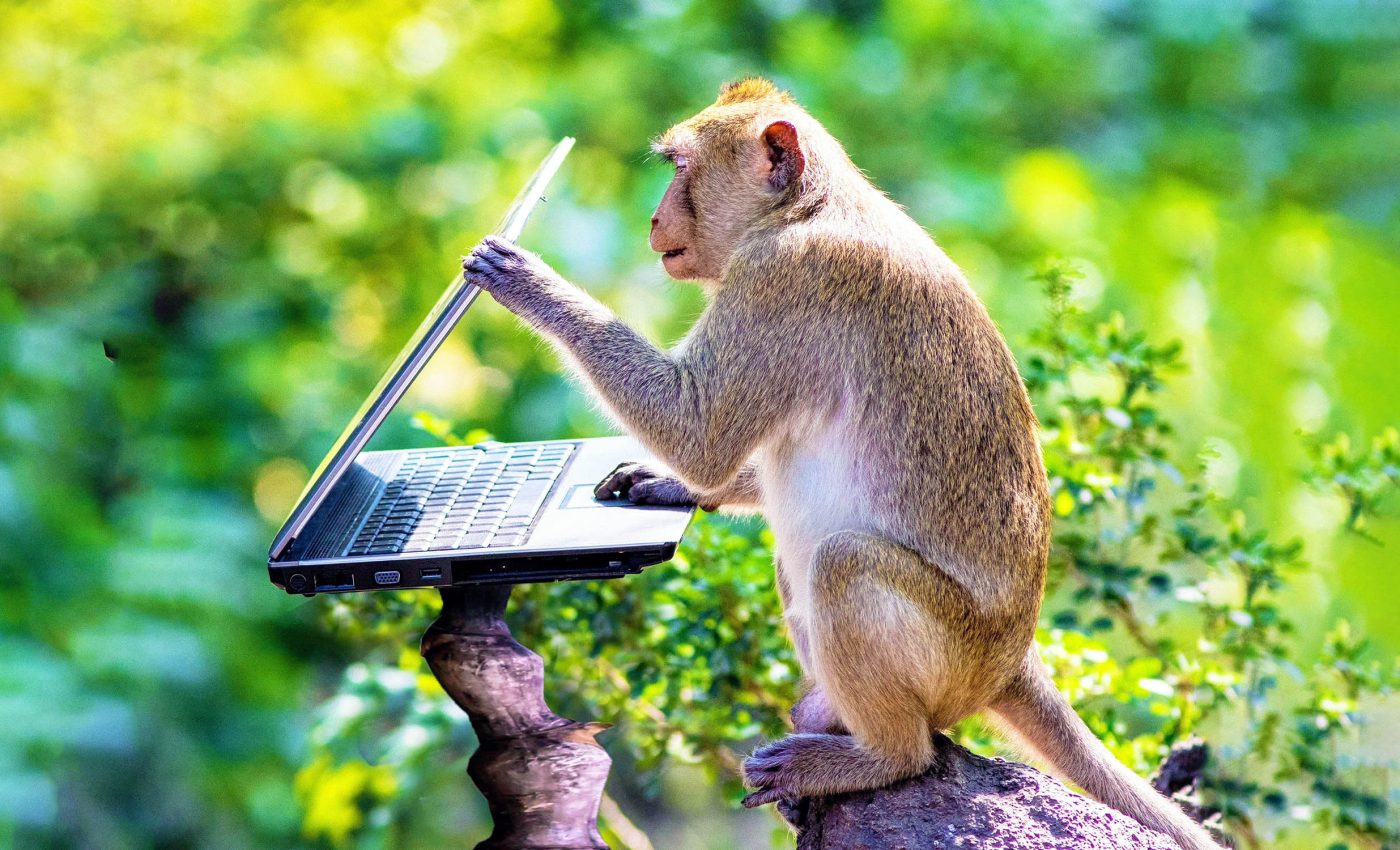
Infinite Monkey Theorem: If a monkey typed for infinity, could it recreate a Shakespeare play?
Just how long would it take for a monkey randomly pressing keys on a keyboard to type the works of Shakespeare? It’s a proposition that electrifies the imagination – one that’s known as the Infinite Monkey Theorem.
The theorem is a favorite in pop culture, making appearances on “The Simpsons,” “The Hitchhiker’s Guide to the Galaxy,” and even TikTok. But how practical is it?
Infinite Monkey Theorem
The Infinite Monkey Theorem proposes a curious thought: given infinite time, a monkey randomly pressing keys on a typewriter could produce the complete works of Shakespeare purely by chance.
This whimsical idea offers us intriguing insights into probability, randomness, and unexpected outcomes.
While the theorem does hold water, it glosses over some critical details, starting with infinite time.
Professor Stephen Woodcock and Jay Falletta, both mathematicians at the University of Technology Sydney (UTS), decided to examine the theorem through the lens of our finite universe.
Monkeys, typing, and a finite universe
“The Infinite Monkey Theorem only considers the infinite limit, with either an infinite number of monkeys or an infinite time period of monkey labor,” said Professor Woodcock.
This prompted the researchers to consider the odds of a string of letters being typed by a finite number of monkeys within a finite time, consistent with estimates for the lifespan of our universe.
For their calculations, they assumed a 30-key keyboard, including the English alphabet and common punctuation.
The typing populace consisted of a single monkey and the current global population of about 200,000 chimpanzees. All of them were considered to be speed typists, hitting a key every second until the universe ends in about 10100 years.
Probabilities and perceptions
The study produced some fascinating results, revealing that a chimp had around a 5% chance to type the word “bananas” in its own lifetime.
Yet, even with an army of chimps, the prospect of typing out the Bard’s entire works (comprising approximately 884,647 words) before the universe’s curtain call is a near impossibility.
“It is not plausible that, even with improved typing speeds or an increase in chimpanzee populations, monkey labor will ever be a viable tool for developing non-trivial written works,” noted the researchers.
Probability and randomness
“This finding places the theorem among other probability puzzles and paradoxes – such as the St. Petersburg paradox, Zeno’s paradox, and the Ross-Littlewood paradox – where using the idea of infinite resources gives results that don’t match up with what we get when we consider the constraints of our universe,” said Professor Woodcock.
So, while the spirit of the Infinite Monkey Theorem is true, its practical application is a different story altogether.
It serves as an imaginative way to understand probability and randomness. But it is, in essence, more of a probability paradox – a light-hearted jest in the complex world of mathematics.
Unpredictable nature of chance
The exploration of the Infinite Monkey Theorem aids in refining our statistical understanding, particularly in realms where randomness and probability play crucial roles.
By examining the finite application of seemingly infinite propositions, researchers can develop methods to tackle real-world problems, such as coding theory and data transmission, where errors must be minimized despite random interference.
The theorem encourages mathematicians and scientists alike to consider both the theoretical and practical aspects of probability.
Theorem inspires curiosity
The whimsical allure of the Infinite Monkey Theorem continues to capture the curiosity of students, educators, and enthusiasts across disciplines.
By engaging with this thought experiment, we are inspired to explore complex concepts like probability theory, infinite processes, and the limitations imposed by our finite universe.
Educators can harness its charm to demystify abstract mathematical ideas, sparking a dialogue that is both educational and entertaining.
This interaction with the theorem not only enhances understanding but also promotes a lifelong enthusiasm for inquiry and discovery, highlighting the power of imagination in the pursuit of knowledge.
AI, typing monkeys, and the future
In our time of AI and generative intelligence, the Infinite Monkey Theorem, and its finite version, provoke us to ponder deeper philosophical questions about creativity, meaning, and consciousness.
As we advance further into the digital age, these are critical ideas worth examining, expanding our understanding of chance, creativity, and the marvelously improbable ways they intersect.
So, the next time you think about a monkey hammering away at a typewriter, remember: while it might technically be possible given an infinite universe, the practical odds of our primate friends churning out a Shakespearean masterpiece are, well, infinitesimally small.
The study is published in the journal Franklin Open.
—–
Like what you read? Subscribe to our newsletter for engaging articles, exclusive content, and the latest updates.
Check us out on EarthSnap, a free app brought to you by Eric Ralls and Earth.com.
—–













